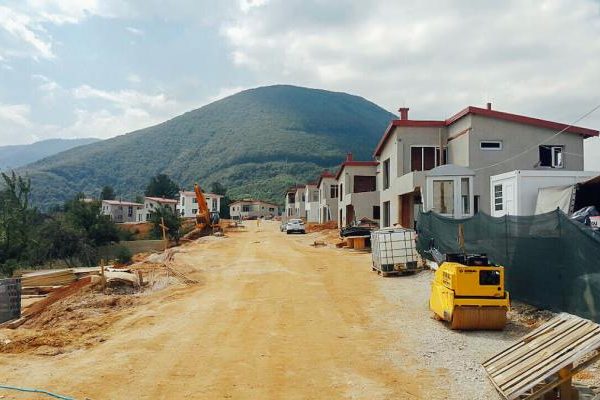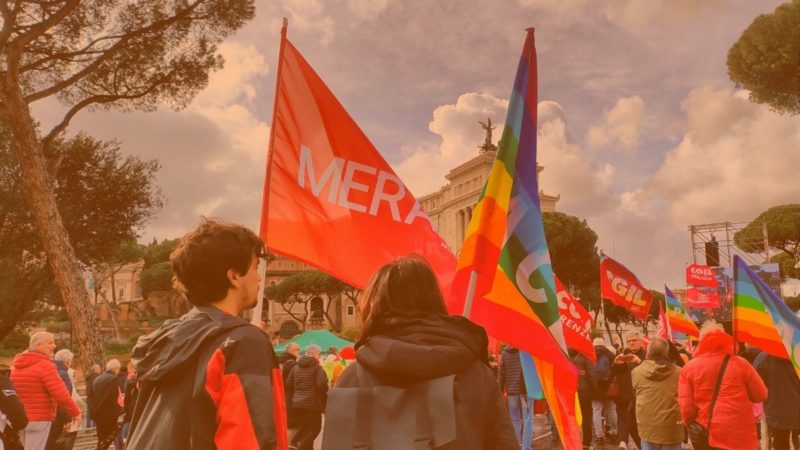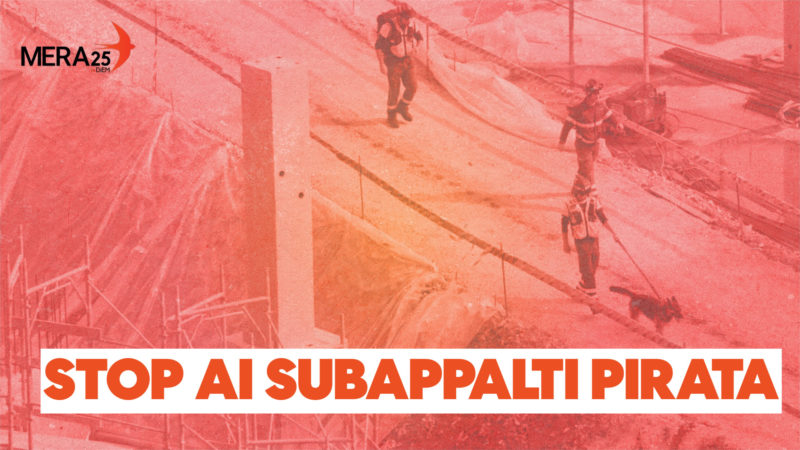By Pieter Stockmans
Sarajevo is etched in the collective memory as a city of war. Twenty years after the peace agreement for Bosnia and Herzegovina, the green hills around the city are changing into gated communities for Arab tourists. Public space is either neglected or privatised, then commercialised. A new generation is sowing the seeds of change.
Written on a monument on the square in front of the new city mall are the names of 1601 children. They were killed during the siege of Sarajevo in the early nineties, together with 9940 others. After the war the city was developed according to the model of privatisations and foreign investments.
Bosnia and Herzegovina is a democratic constitutional state only on paper. In reality it is an oligarchy where the politicians enrich themselves. 18% of the population lives below the poverty line. Only 1% of the GDP goes to social security expenses – the EU-average is 30% – while 62% of youth is unemployed.
Nature and city combined
For five euro’s and in ten minutes a cab brings you from the busy centre of one of the most highly polluted cities in Europe to an unspoilt natural environment, with green valleys, flowers, fruit trees and clean air. In this postcard there is an Audi with a Kuwaiti license plate.
The driver, wearing a suit and sunglasses, stands guard. A man gets out of the car and looks out over the valley, the view the Bosnian Serbs must have had when they fired an average of 329 bombs and mortars a day at Sarajevo.
‘The future lies ahead of us’, the man says. ‘In Sarajevo one finds peace, nature and the city in one.’

An investor from Kuwait takes a look at the lands where Saraya Resort will be built, today unspoilt nature. © Pieter Stockmans
As soon as the construction workers finish their job, Saraya Resort will be prohibited territory for them. No one will be allowed to enter the territory without a special pass. Caphy’s customers won’t shop at the local supermarkets, but in a shopping mall in the resort. They will be able to order drivers, cleaning ladies and housekeepers at a reception, just as they do in the Gulf.
Villagers are surprised when they see the car with blinded windows drive down the narrow mountain roads. The property is located in the municipality of Stari Grad – Old City – that reaches from the city centre down in the valley all the way up to the green hills with only a few charming homes here and there.
Within a few years, 64.000 square metres of this unspoilt grassland will transform into the capitalist dream, with 90 villas and flats, closed off from the environment.
“Where nature and living come together”, a presentation reads in the showroom of the company. Real estate companies from the Gulf States attract customers with the promise of idyllic nature around Sarajevo. ‘For every tree we cut down, we plant two’, says Dunja Jerković, office manager of the company in Sarajevo.
But that is not the end of it, according to Rijad Tikvesa, director of the environmental NGO Ekotim: ‘I saw many building licences, but not one environmental impact assessment report. How much earth will be moved, with the risk of mudflows during tempests?’
‘Two years ago roads disappeared in the land subsidence. Will the rainwater still fill up our groundwater stocks when asphalt covers the land? Where will the pipelines dump the waste water? A big part of the city’s waste water already flows into the river Bosna. Will they use tax money to connect these gated communities to public infrastructure?’
Caphy Contracting is part of the first rush. These start-ups have just discovered Sarajevo’s gold, the empty showroom testifies. The long-term effects on the city are not yet visible, but in a country notorious for it’s entanglement of politics and business, it looks like the hills around Sarajevo are going to change beyond recognition.
Jerković herself is concerned: ‘According to the city’s spatial planning we are at the edge of building space. I hope, for the future of our children, that our government won’t change the plans.’
According to Tikvesa that is idle hope: ‘Small municipalities are authorised to grant building licenses to big Arab companies. The temptation to change the destination of natural- or agricultural lands into building space, is great.’
Cleaning hills
Dunja Jerković herself has two children. When she was looking for and found a job, she couldn’t afford sustainability thinking. Also Jasmina, an architect at Al-Diyar, the Kuwaiti company that will help building Saraya Resort, was thrilled when the company hired her. ‘I was looking for a job for five years’, she says. ‘Now I have a decent salary and a higher level of social protection compared to employees from Bosnian companies.’
Director Abdullah al-Kulaib, a flamboyant man of 34, looks out over his resort Ilidža Pearl, barely two years after he settled in Sarajevo.
Al-Diyar employs about a hundred Bosnians. ‘We design and build our landscapes, houses and furniture ourselves’, says al-Kulaib. ‘In that house over there we will lodge three poor Bosnian families. They will get jobs as cleaners, guardians and gardeners.’
It’s mealtime on the construction site: builders in dusty work clothes are standing in line at the food distribution. Jasmina comes running from the PVC workshop. ‘Abdullah, I want to show you something’, she yells enthusiastically. ‘They have delivered the ceramic tiles, a combination of modern and traditional Bosnian elements.’ Al-Kulaib finds it all fantastic.
The labour costs in Bosnia are low and the land is cheap. Al-Diyar bought parcels of different Bosnian families. ‘Some owners gave me a headache’, Al-Kulaib laughs. ‘Sons who sold the lands of their deceased parents lived spread out across Serbia, Austria and Bosnia. And when we had finally gathered them, they couldn’t agree.’
The Foreign Investment Promotion Agency (FIPA) of the federal state helps investors in their contacts with the municipalities, who help finding the landowners. ‘We also guide them through the labyrinth of the Bosnian bureaucracy’, says Slavica Korica of the FIPA.
That labyrinth is hindering the freedom of young Bosnians of doing business: the country is ranked 175th in the World Bank’s list ease of doing business-list.
‘Wealthy investors can speed up the process by paying money under the table to local politicians’, says Lejla Ibranović, director of Transparency International in Bosnia and Herzegovina. ‘The representatives of the Bosnian state are involved in business. There is a total absence of a regulating state. Political parties are the most corrupt institutions of this country. High-ranking politicians abuse their positions to give benefits to family, friends, party members, investors, and so on. The public prosecutor barely prosecutes corruption offenses within the government, because the parties control the judiciary.’
Elmedin Konaković, the prime minister of the canton of Sarajevo, refused to speak to us.
President Bakir Izetbegović has good ties to several investors. ‘A few weeks ago a group of investors from Europe and the Gulf met the president’, says Al-Kulaib. ‘We proposed to open a direct airline between Kuwait and Sarajevo.’
Every week 29 direct flights depart from the Emirates to Sarajevo, but Kuwait can only be reached through Istanbul.
‘Up until five years ago Bosnia was unknown to most Gulf Arabs’, says analyst Asja Hadziefendić in her smoky office in the Bureau of Tourism. ‘Since the beginning of the Arab uprisings they are looking for new destinations.’
According to Hadziefendić a lot is happening in the grey zone, because according to Bosnian law, Gulf Arabs are not allowed to own property in Bosnia.
‘So we conclude a 99 year-lease with our customers’, says Al-Kulaib. ‘I asked the Bosnian ambassador in Kuwait to allow Kuwaitis to own property in Bosnia. Since last week we also market our real estate to the Bosnian diaspora.’ On the rooftop terrace of one of the luxury apartments, Rijad Sinyora, Al-Kulaib’s assistant, lets his imagination go free: ‘Imagine sitting here at sunset with a cup of coffee and the water pipe. In winter you can ski in the morning, swim in the thermal bath by noon and have a delicious dinner in the evening.’
As a teenager, Sinyora lived under the siege of Sarajevo. During the same time Al-Kulaib was raising funds for Sarajevo at the university. Today their life paths cross.
The traumatised Bosnian employee jumps on the ark to protect himself from the storm that crushes the weakest; he knows that in this country only the strong survive. The jolly Arab employer does what he does best: speculate, invest and build. ‘Some customers buy a house and keep it until prices rise, to resell it afterwards. An investment’, he says.

Down the hill lies the Bosnian village of Blazuj. A woman pushes her sheep towards the fields. Her livelihood costs about twice as much as the average Bosnian monthly salary of 300 euro’s. She looks up at the U-shaped ring of luxury apartments, which Al-Diyar launches for people with a monthly salary of 3500 euro, the Gulf’s lower middle class.
She also sees a fence. Later come the cameras and alarm systems, connected to Ilidža’s local police.
This report was published by MO* magazine. Continue reading here.
Volete essere informati delle azioni di DiEM25? Registratevi qui!




